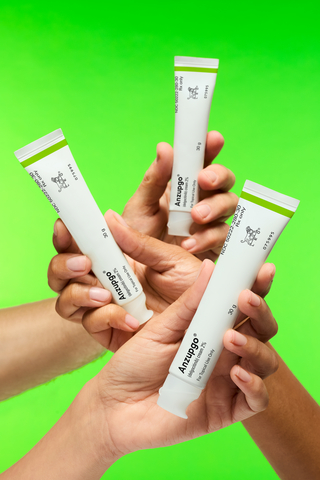Delgocitinib cream (Anzupgo, Leo Pharma, Inc.) is now available for the treatment of adults with moderate-to-severe chronic hand eczema (CHE) in the U.S.
Delgocitinib cream is a steroid-free, topical pan-Janus kinase (JAK) inhibitor approved for adult patients whose CHE is not well-controlled or cannot use topical corticosteroids.
Based on DELTA 1 and DELTA 2 Results
The U.S. Food and Drug Administration’s (FDA) approval of delgocitinib cream is based on two pivotal randomized, double-blind, vehicle-controlled studies of identical design, DELTA 1 and DELTA 2, that evaluated the safety and efficacy of delgocitinib cream in a total of 960 patients, aged 18 and older, with moderate-to-severe CHE. The primary efficacy endpoint of both trials was the Investigator’s Global Assessment for chronic hand eczema treatment success (IGA-CHE TS) at Week 16, defined as a score of 0 (Clear) or 1 (Almost Clear) with at least a two-point improvement from baseline.
In DELTA 1, 20% of patients treated with delgocitinib cream achieved this outcome versus 10% with the cream vehicle (p = 0.006). In DELTA 2, 29% of delgocitinib-treated patients achieved IGA-CHE TS compared to 7% for the cream vehicle. Both trials also met all their key secondary endpoints. Using the Hand Eczema Symptom Diary (HESD) to measure the severity of itch (n = 949) and pain (n = 875) in CHE patients, at Week 16, 49% of patients treated with delgocitinib cream in DELTA 1 and 49% in DELTA 2 achieved a ≥four-point reduction in the HESD pain score, compared to 28% and 23% for pain in the cream vehicle groups.
Further, at Week 16, 47% of patients treated with delgocitinib cream in DELTA 1 and 47% in DELTA 2 achieved a ≥four-point reduction in the HESD itch score, compared to 23% and 20% for itch in the cream vehicle groups.
Clinical studies found that delgocitinib cream offers a favorable safety profile comparable to the cream vehicle. Adverse reactions that were reported in ≤1% of subjects were application-site pain, paresthesia, pruritus, erythema, bacterial skin infections, other skin infections, leukopenia, and neutropenia.


